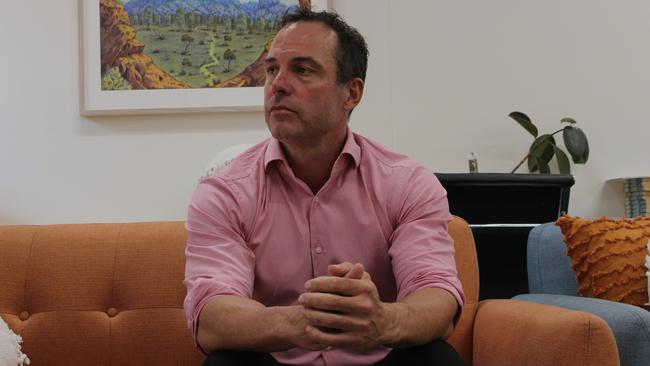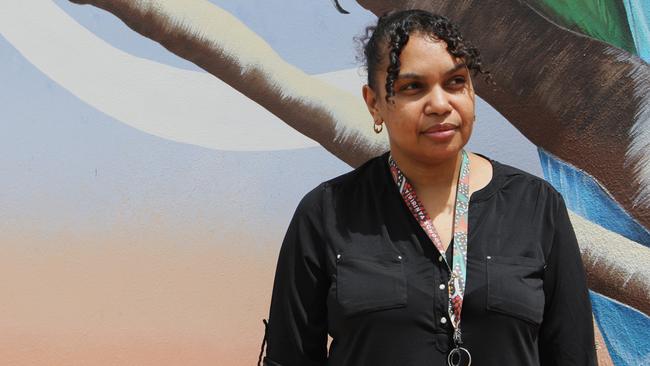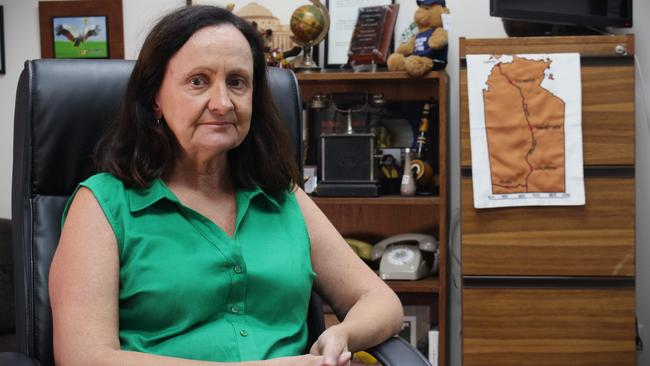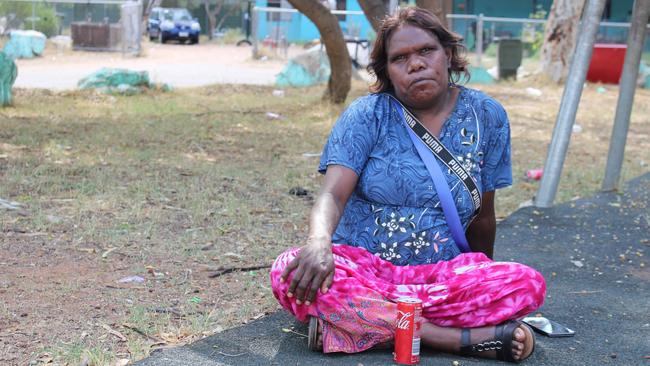As principal of Yipirinya School, Gavin Morris is on the front line of the social problems bedevilling Alice Springs that drew the eyes of a nation and the polished boots of its Prime Minister just more than a year ago.
Back then, Dr Morris says, there were “a couple of girls in particular who were in constant contact with the police”.
“(They) were in and out of Owen Springs (Youth Detention Centre), had the monitoring bracelets on, were very much involved with the judicial system,” he says.
“Stealing buses, smoking drugs – the full gamut – at a very young age.”
But 12 months on, Dr Morris says the school has seen “significant improvements” in levels of anti-social behaviour and youth crime, with those same girls lifting their attendance after bottoming out at 7 or 8 per cent.
“By the end of last year it was 80 per cent,” he says.
“So where, at the start of the year, they were barely coming to school at all, by the end of the year they were coming almost every day.
“Now (they) have no contact with the police, now have no monitoring bracelets, in fact are fully active and accepted members of society.”
And while Dr Morris credits the school’s wellbeing programs and hardworking staff with the turnaround, it would have been a much tougher ask if not for the alcohol bans precipitated by Anthony Albanese’s visit.
He says it was the preceding sunsetting of Intervention-era legislation that flooded many of the school’s students’ homes with alcohol that “shook us to our core”.
“When the Stronger Futures legislation was repealed it was like an earthquake through Yipirinya and our whole base was shaking and it was all of a sudden on very, very sandy ground,” he says now.
“So while I acknowledge that self-determination and self-governance and Aboriginal leadership should dictate what happens in each of the communities — and they’re all very different — my experience has been that where alcohol is present, outcomes for the community go down the drain.”

Yipirinya’s community engagement co-ordinator Sherry Lowah is one of the school’s success stories, having started out as a student before graduating to paid employment helping the next generation replicate her success.
The 32-year-old Arrernte woman agrees with Dr Morris that alcohol restrictions have made “a huge difference” in keeping many of her young charges on the straight and narrow.
“We noticed that we were engaging more with families during the first two days (of the week, when bottle-os are closed), so that was a huge impact and huge difference,” she says.
“You can kind of feel the difference with the kids, it’s like ‘Oh yeah, my parents are home’.
“Families are home and there’s no alcohol, the family have no reason to be elsewhere so the kids are just staying home.”
Ms Lowah says she mainly grew up on outstations out of town but used to visit family in Alice Springs’ Aboriginal town camps, where the alcohol bans are now back in force.
She says as a kid, even pre-Intervention when there were no restrictions, “it was so much better”.
“You could feel that community love and caring nature, you could actually go visit, your kids were safe,” she said.
“There wasn’t really much alcohol, there were delegated houses like where people would have a drink and everyone knew it was not safe to go between these times because it’s adult time — whereas now it’s just exposed everywhere.”
But she says one thing that hasn’t changed is the standard of housing those living in the town camps have to put up with.
“All these keywords like homelessness, overcrowding, I don’t think most of the people in the communities understand the terms of them,” she says.
“In my experience, I became a young mum as well and I was living with families at the time, I was looking for accommodation.
“I did not understand those terms until someone explained to me ‘You are actually homeless’.
“Just not understanding like sharing a room with three people is not OK.”

The principal puts a finer point on the housing situation.
“The dysfunction in the town camps is related to alcohol and drug abuse for sure but the standard of the housing, the overcrowding, the living conditions, the lack of food security, the sexual assault, let’s call it for what it is,” Dr Morris says.
“The absolute poverty that these town camps and many of our Yipirinya community are forced to live in impacts attendance at school and engagement at school significantly.
“Some of these families are amazing, they do an amazing job, there’s a lot of love and it is a safe house in community, but there’s too many and it’s a growing number, who don’t enjoy those circumstances.”
Dr Morris is also an elected representative on the Alice Springs Town Council and he says while the local government doesn’t service the town camps “there is an organisation that does”.
“Tangentyere Council is charged with the responsibility of servicing and providing safe accommodation for our town campers that surround Alice Springs and it’s absolutely in a diabolical mess, there’s no other way to describe it,” he says.
“I’m not suggesting for a moment that Tangentyere are using their resources that’s in any way inappropriate or illegal, what I’m suggesting is that the most important Aboriginal organisations — and Tangentyere is one of them — should be held to the highest account.
“And it’s very clear when you travel around the 16 town camps that there’s a problem here between what’s going on in the town camps and where the buckets and buckets of money is going at Tangentyere, the gap between the two is so stark, and it’s generational now.
“The hundreds and hundreds of millions of dollars that goes into Tangentyere to service our town camps, where does that money go?”

Long-serving independent Member for Araluen Robyn Lambley is less upbeat about what has changed in her home town of three decades since the grog bans came back in a year ago.
“Essentially it feels like nothing’s changed,” she says.
And in the 30 years since she first visited one of the town camps as a social worker, her assessment is equally bleak: “Nothing has changed and nothing has improved.”
Ms Lambley says she still semi-regularly drives through the town camp in her electorate, Abbott’s Camp (Mpwetyerre), and she describes the standard of living there as “a disgrace”.
“How those people survive and why they choose to remain living there …” she trails off.
“I do understand why, they probably don’t have any choices, but the quality of their life is not good, it’s unacceptable — that’s never changed.”
Ms Lambley says she too has “a problem with this government throwing buckets of money at Tangentyere Council”.
“They are in receipt now of more public money than ever before and yet they appear to be delivering very little to their own people,” she says.
“In terms of people living in poverty and horrific circumstances in Alice Springs, nothing’s changed, nothing’s improved — closing the gap? Can’t see it.”
Ms Lambley was the chair of the NT parliament’s Public Accounts Committee when the government embarked on one of its last serious probes into the management of town camps in 2016.
But even with her experience, she says town camp administrators remain “very difficult organisations to understand”.
“It’s extraordinarily complicated and once you start poking around in that space the shutters go down but I think universally people can see that what’s going on is just unacceptable,” she says.
“Tangentyere Council is not all bad, I’m not saying that and there’s some really great people involved, but it doesn’t work.
“And if money’s just disappearing into the ether and things aren’t changing then administrators of the public money of the NT, the government, has to do something.”

The Territory government’s current strategy is contained in its “Building our communities, together Town Camps Reform Framework 2019-2024”, the last progress report for which was produced in 2021.
The framework acknowledges that “overall the standard and condition of housing in town camps is significantly lower than that of urban public housing and private sector housing”.
Meanwhile, the 2017 NT government commissioned Living on the Edge report rated housing in Alice Springs town camps as “good” but governance as “very poor”.
In response to questions from the NT News, an NT government spokeswoman said the framework would remain in effect until June this year, with $45.6m allocated for housing and infrastructure upgrades in town camps since 2017.
She said the final report would be released upon conclusion of the framework in 2024.
“Since September 2016 until February this year, 77 new or replacement homes have been delivered within the Alice Springs town camps,” she said.

For now at least, Abbott’s Camp is the place Pitjantjatjara woman Raylene Kunoth and her three children call home.
She says the drinking “is a little bit settled down” since the restrictions came in and all her kids are kept busy at school and with other activities and they don’t “run amok in Alice Springs” like some others.
“This is where we want to be in normal, not to open the (bottle shops) again,” she says.
“(When) we was little, we have (relatives) they were drinking, and we grow up and we don’t want to be like them, they had long time too much drink.
“We want our kids to see mum and dad in work and the kids go to school and follow the footsteps where mum and dad doing lots of good work, not like drinking, so we want this alcohol (shops) not to open.”
But also: “We need more houses here.”
“Too many family from outside here in the town camp, so we need new houses,” she says.
On March 12, the federal government announced a historic $4bn investment for remote housing in the NT, promising to deliver 2700 new homes in Aboriginal communities within the next decade.
In response to questions about how the funding would be distributed, a spokeswoman for Indigenous Australians Minister Linda Burney confirmed town camps in Alice Springs were included in the remote housing footprint.
The spokeswoman said 28 houses were completed across 10 Alice Springs town camps between July and December last year, but she deferred further questions about the new rollout to Aboriginal Housing NT.
AHNT did not respond to voicemails or a series of questions sent via email.
The NT Government spokeswoman said while Tangentyere Council was not involved in administering funding or oversight of remote housing investment, it was responsible for delivery of municipal and essential services on town camps.
She said the Joint Steering Committee on Remote Housing, including the NT and commonwealth governments, land councils and AHNT, was responsible for oversight of the funding for the new builds.
Tangentyere Council did not respond to repeated requests for an interview or to a series of questions about its management of town camps.
But in the most recent (2017-18) annual report published on its website, then chief financial officer Jason Dawson said the organisation’s operating income had increased by more than $5m, with “employee costs” making up 67 per cent of all expenses.
Mr Dawson also noted external auditor Deloitte had issued Tangentyere Council with “a clean audit opinion”.
“If Deloitte had found any problems in relation to our finance procedures and controls, they would have said so and would have stated that they were unable to form an opinion on the accounts,” he wrote.
“Tangentyere has a very tight purchasing process to ensure that its funds are all spent according to the received funding.
“No purchase must happen without a purchase order and all purchase order requests must be authorised by the appropriate levels of authority.
“In an uncertain environment, it is important that Tangentyere provides good quality services to as many clients as possible to help improve their lives and futures and for this reason it is important that expenditure is tightly controlled.”
Meanwhile, in 2017, the Living on the Edge report observed that “Tangentyere were not happy with the decision to undertake the review and actively opposed elements of it” but later agreed to participate using a different methodology.
“The original methodology was designed to provide an independent, place-based, vision for each of the town camp communities from information gathered by local Aboriginal people,” it reads.
“Tangentyere’s resistance made this more difficult than anticipated and the modified process has provided a collective vision for town camp communities in Alice Springs.”
Back on the front line at Yipirinya, Dr Morris says the “fluffing around the edges and the frangipani throwing needs to stop”.
“We need to be keeping everybody accountable who works in this space — we seem really keen to keep the 10 and 12-year-olds accountable,” he says.
“When they partake in anti-social behaviour we’re pretty keen to find them a jail cell somewhere to teach them a lesson: ‘Well if you act like this, this is your consequence’.
“Why don’t we hold the rest of Alice Springs and Central Australia equally accountable?”


Add your comment to this story
To join the conversation, please log in. Don't have an account? Register
Join the conversation, you are commenting as Logout
Three Territorians, one lifesaving legacy as RLSS turns 60
From tea with the Queen to fighting for free swimming lessons, Daphne Read fought for six decades to stop NT kids from drowning while RLSS member Michael De Silva nearly did.
Mum forced to choose between home or costly diabetes treatment
The trauma of losing her 13-year-old daughter to diabetes has haunted Kerrie Matthews for decades, now she's being forced to abandon her retirement dreams to afford her own treatment.